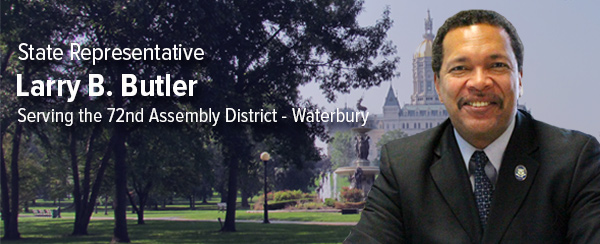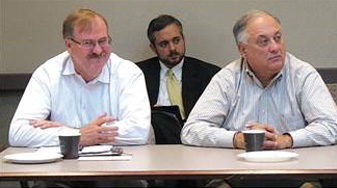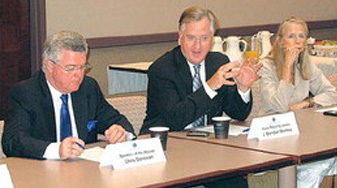
September 15, 2011
By David Krechevsky, Republican-American
WATERBURY - Thomas Samph, president and chief executive officer of Post University, had a simple message Wednesday for two members of the state legislature’s Democratic leadership.
“‘For-profit’ is not a bad word,” he told House Speaker Christopher G. Donovan, D-Meriden, and House Majority Leader J. Brendan Sharkey, D-Hamden. “The point is that the state treats us as though we’re something bad, when we’re not.”
Samph said the state should not target nor punish businesses for making a profit, especially his private for-profit university — the fastest-growing higher education institution in the state — because his is one of the few institutions in Connecticut consistently adding jobs.
His comments were among many made by education and business leaders from the region during a business roundtable Wednesday morning hosted by the Waterbury Regional Chamber at its offices on Bank Street.
Connecticut could reverse most of its small business losses from the decade just prior to the last recession by easing the burdens that make it one of the most regulated states in the nation, according to the University of Connecticut’s latest quarterly economic journal.

Christopher A. Gallo, left, a partner with the accounting firm Blum, Shapiro & Co. in Shelton,
and Mark E. Lancor, principal engineer with DyMar Land Services in Southbury, participate in a business roundtable with state legislators Wednesday at the Waterbury Regional Chamber.
David Krechevsky, Republican-American

House Majority Leader J. Brendan Sharkey, D-Hamden, center, speaks with business and education officials Wednesday during a business roundtable hosted by the Waterbury Regional Chamber. Seated with Sharkey are House Speaker Christopher G. Donovan, D-Meriden, left, and Sen. Joan V. Hartley, D-Waterbury.
David Krechevsky, Republican-American
Joining Donovan and Sharkey were three members of the city’s legislative delegation: Rep. Jeffrey J. Berger, D-73rd District; Rep. Larry B. Butler, D-72nd District, and Sen. Joan V. Hartley, D-Waterbury. The intent of the roundtable, the legislators said, was to listen to concerns and gather ideas for Gov. Dannel P. Malloy’s special session on jobs, which is tentatively scheduled to begin Oct. 26.
Berger said the session will focus on a number of jobs-related areas, including education and the vocational-technical schools, manufacturing, small businesses, and the health care sector.
Hartley said the jobs session can’t begin soon enough.
“We do not have any more time,” she said, noting that the seven-town Waterbury labor market has had the state’s highest unemployment rate for more than a decade. “We are more than hanging over the cliff here.”
Hartley said she would like Malloy to refocus his First Five economic development program, which offers tax credits and incentives to large businesses that agree to create 200 new jobs within two years or invest $25 million and create 200 new jobs within five years. The program has already awarded credits and incentives to Cigna, TickeNetwork and ESPN, but Hartley said it should target companies in key communities.
“The jobs initiative should be tied to unemployment,” placing jobs in areas like Waterbury that have had high unemployment for a long time, she said.
The chamber’s Public Policy Committee offered its ideas, also suggesting Malloy alter the emphasis of the First Five program.
“Rather than providing additional incentive packages to a small number of large corporations ..., the state could make a similar-sized investment of broader job creation incentives for small and medium-sized businesses,” the committee said in a statement.
To deal with the region’s high unemployment rate, it suggested overhauling training programs for both unemployed and current workers to focus on manufacturing, and increasing support for brownfields redevelopment. It also suggested reducing state unemployment benefits to 26 weeks, and raising the standard for requiring the unemployed to actively look for work and to document that search.
Financially supporting precision manufacturing training programs, meanwhile, is a subject near and dear to the heart of Richard DuPont, president of Resource Development Associates in Watertown and a training consultant. He said the state needs to provide more money for precision manufacturing training programs, particularly to retrain the unemployed.
“We need more workers than the vo-tech schools can produce,” he said. Lisa Hylwa, principal of Kaynor Technical High School in Waterbury, said that with better input her school’s curriculum could be more closely aligned with the needs of manufacturers in the region. She added, however, that many manufacturers won’t offer workplace training to high school students because of fears about liability, even though each company’s insurance policy would also cover any student who suffers an injury.
“There’s still a reluctance there,” Hylwa said. “We want the community to know that we are trying to have students work in the community. We don’t want manufacturing to die.”
Christopher A. Gallo, a certified public accountant and partner with Blum, Shapiro & Co. in Shelton, told the legislators that reducing regulation and creating certainty for businesses would help to create jobs. He said anyone starting a business today faces a “morass” of state regulations.
“If I had to start a business, I’m not sure I could even help somebody get through the morass,” he said. “When people don’t know what to expect ..., it’s very difficult to plan your future, and you don’t want to hire people.”
Samph, the Post University executive, said his institution just hired 60 workers and is “desperate” to hire more. He said it could eventually employ as many as 1,000 people at its Waterbury campus.
The problem, he said, is that it costs $15,000 per employee to train each new hire, and another $2,000 to $4,000 to recruit each worker, because the region does not have a large pool of workers with the needed skills. He supported the idea of the state funding retraining, but said the state also could encourage businesses to hire simply by treating them more equitably.
Legislative Office Building, Room 5001
Hartford, CT 06106-1591
(860) 240-8585 | 1-800-842-8267
Larry.Butler@cga.ct.gov


